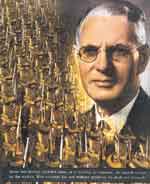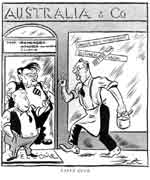|
|
||
|
The advent of World War II and the collapse of the United Australia Party government gave John Curtin the opportunity to put his dreams into practice. The fact that he took office during wartime gave him unprecedented powers while his decision not to form a government with the opposition meant that he could maintain the Labor platform. Despite the war, John Curtin made sure that his government maintained a commitment to the worker. He worked to implement social welfare legislation, increased the pay of soldiers so that their families could survive and ensured that the government had access to Commonwealth Bank funds to prevent a depression. When Japan entered the war, John Curtin ensured that Australia showed its autonomy by declaring War on Japan, Finland, Hungary and Romania independently from Britain. In the interest of defending Australia, John Curtin looked to America rather than to Britain. John Curtin also worked to forge national unity to support the war effort. Finally, while John Curtin was wartime Prime Minister, he worked towards |
setting up a framework to ensure that Australia would prosper in the post war period. In many ways, Chifley's welfare state was the child of John Curtin's efforts. A
STRONG LEADER John Curtin Prime Ministerial Library, Records of the Curtin family, poster depicting John Curtin with quote, distributed in Man Magazine, n.d., JCPML 00403/32. |
Extract from John Curtin's speech announcing the declaration of war with Japan A
SENSE OF OPTIMISM John Frith, "Taken Over", 8 October 1941, Bulletin p.10. Courtesy of the University of Western Australia Library and the Frith family. |



